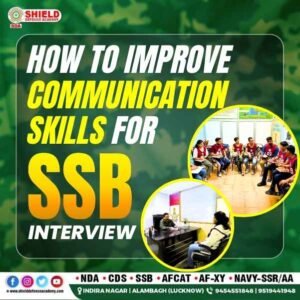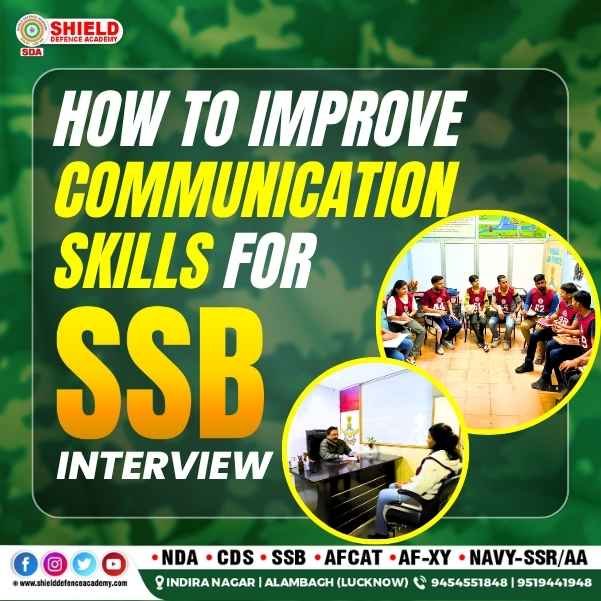How to Improve Communication Skills for SSB Interview guide by Best defence academy in Lucknow
Let’s get real: No matter how well-prepared you are with facts and strategies, if you can’t communicate them effectively, it could cost you your dream. The SSB interview isn’t just about knowledge—it’s a test of your ability to lead, express, and connect. In this article, we’ll walk you through how to improve communication skills for SSB interview, the way it’s done at Shield Defence Academy, the most trusted name in defence coaching in Lucknow.

The Real Nature of SSB Interviews
Where Communication Gets Evaluated
Communication skills are assessed at every stage of SSB:
-
Screening Tests (OIR + PPDT)
-
Psychological Tests (WAT, TAT, SRT, SD)
-
GTO Tasks (GD, GPE, Lecturette)
-
Personal Interview
Spoken vs. Unspoken Communication
Verbal communication includes:
-
Speaking clearly
-
Using the right words
-
Logical flow of thoughts
Non-verbal signals involve:
-
Your gestures
-
Facial expressions
-
Eye contact
-
Posture
Both together create your first impression.
Challenges Most Aspirants Face
Many candidates struggle with:
-
Stage fear that blocks clear expression
-
Limited vocabulary, especially under pressure
-
Inability to frame answers properly
-
Uncontrolled body language that reveals nervousness
Shield Defence Academy helps aspirants tackle these issues systematically.
Why Communication Skills Can Make or Break Your SSB
Your communication during SSB speaks volumes about:
-
How confidently you handle pressure
-
Whether you can influence others
-
Your leadership potential
-
Your emotional maturity
Every sentence you speak reflects your Officer-Like Qualities (OLQs).
Don’t Underestimate Body Language
Words are only half the story—your body tells the rest.
Things that matter:
-
Firm handshake = Confidence
-
Good posture = Alertness
-
Calm facial expressions = Composure
-
Balanced eye contact = Honesty
These subtle cues can deeply impact how assessors perceive you.
How to Improve Communication Skills for SSB Interview
Here’s a blueprint developed and recommended by the team at Shield Defence Academy:
1. Develop Strong Vocabulary & Fluency
Start with:
-
Learning 5–10 words daily with their usage
-
Reading short stories or blogs and repeating them aloud
-
Using mobile apps like Anki, WordUp, or Duolingo
Make fluency fun and easy!
2. Cultivate the Habit of Reading & Watching English Content
Consume English actively:
-
Read newspapers like The Hindu or Indian Express
-
Watch programs like BBC World News, NDTV, or Rajya Sabha TV
-
Discuss what you learn in English with friends or peers
It builds knowledge and improves expression.
3. Engage in Group Speaking Activities
This includes:
-
Daily group discussions
-
Debates on trending topics
-
Lecturettes on defence or general issues
Shield regularly organizes these sessions to make students comfortable with public speaking.
4. Record Yourself and Analyze Your Speaking Style
Use your phone or laptop:
-
Record short speeches
-
Play them back and note where you hesitate
-
Monitor tone, speed, and clarity
This is part of the daily self-evaluation practice at Shield.
5. Attend Mock Interviews Regularly
Simulate the real experience:
-
Practice answering personal questions
-
Learn how to introduce yourself smartly
-
Get feedback from experienced officers at Shield
This practice prepares you for the real SSB interview environment.
6. Sharpen Writing for Story-Based Tests
For PPDT and TAT:
-
Think fast, write clearly
-
Use a three-act story structure (Intro, Conflict, Resolution)
-
Practice daily with new images or prompts
Shield Academy has dedicated TAT/PPDT workshops for this purpose.
Inside Shield Defence Academy’s Communication Training
What makes Shield different?
-
Daily speech sessions with feedback
-
GD practice twice a week
-
Weekly lecturette drills
-
Voice modulation coaching
-
Body language correction sessions
-
Personal mentoring from retired defence officers
Everything is aimed at building real confidence, not just theory.
Do’s and Don’ts for SSB Communication
What You Should Do
-
Speak respectfully
-
Keep eye contact consistent
-
Stay calm and collected
-
Be honest and natural
What to Avoid
-
Interrupting others during GD
-
Bluffing or over-exaggerating
-
Speaking too fast or mumbling
-
Overusing filler words like “umm,” “you know,” etc.
How Shield Defence Academy Creates Confident Communicators
At Shield, it’s not about one-size-fits-all. Every student gets:
-
Custom improvement plans
-
Regular feedback from mentors
-
Interaction with ex-SSB officers
-
Motivational training from army veterans
All designed to turn shy speakers into confident future officers.
Conclusion
Improving your communication is not about speaking English like Shakespeare. It’s about being clear, confident, and convincing. In SSB, your words showcase your thoughts—and your thoughts showcase your leadership. By following the right plan and practicing consistently, anyone can master it.
And if you’re looking for real change, Shield Defence Academy in Lucknow is where serious aspirants go to level up. Their unique approach to teaching how to improve communication skills for SSB interview has helped hundreds crack it with flying colours.










